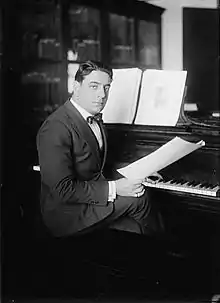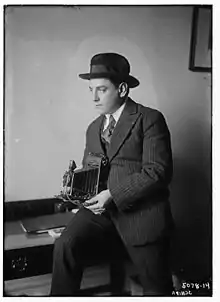Tito Schipa
Tito Schipa (Italian pronunciation: [ˈskiːpa]; born Raffaele Attilio Amedeo Schipa; 2 January 1889 in Lecce – 16 December 1965) was an Italian tenor, considered the greatest tenore di grazia and one of the most popular tenors of the century.


Biography

Schipa was born as Raffaele Attilio Amedeo Schipa on 27 December 1888 in Lecce in Apulia into an Arbëreshë family;[1] his birthday was recorded as January 2, 1889 for military conscription purposes.[2] He studied in Milan and made his operatic debut at age 21 in 1910 at Vercelli. He subsequently appeared throughout Italy and in Buenos Aires, Argentina. In 1917, he created the role of Ruggiero in Puccini's La rondine.
In 1919, Schipa traveled to the United States, joining the Chicago Opera Company. He remained with the Chicago company until 1932, whereupon he appeared at the New York Metropolitan Opera from 1932 to 1935, and again in 1941. He also sang at the San Francisco Opera, beginning in 1924.
From 1929 to 1949 he performed regularly in Italy, including at La Scala, Milan and the Rome Opera. He returned to Buenos Aires to sing in 1954. In 1957, he toured the Soviet Union.
Schipa's artistry is preserved on film. For example, in 1929 he appeared in two Vitaphone movie shorts, singing "M'appari tutto amor" from Flotow's opera Martha and "Una furtiva lagrima" from Donizetti's L'Elisir D'Amore.
Schipa's stage repertoire, which in his early career had encompassed a wide range of Verdi and Puccini roles, eventually contracted to about 20 congenial Italian and French operatic roles, including Massenet's Werther, Donizetti's L'elisir d'amore and Cilea's L'arlesiana. In concert, Schipa performed a preferred array of lyrical operatic arias and songs, including Neapolitan and Spanish popular songs.
Schipa made numerous recordings of arias and songs during his career, beginning in Italy in 1913. His recorded output included a famous 78-rpm set of Donizetti's Don Pasquale, made in 1932. This is still available on CD. He also recorded several tangos, some of which were composed by him in Spanish, mostly in Buenos Aires and New York. Thanks to his early Latin American tours, Schipa was a very popular tenor in Latin America.
Like his contemporary Richard Tauber, Tito Schipa was also a conductor, a tradition carried on today by Plácido Domingo. Although a few contemporary critics considered Schipa's voice to be small in size, restricted in range and slightly husky in timbre, he was still extremely popular with the public. Michael Scott (The Record of Singing: 1978), while admiring Schipa's charm and taste, points out that it is not correct to say that Schipa was a master of bel canto; indeed Scott and others regard Schipa's recording of "Il mio tesoro" from Mozart's Don Giovanni as one of the worst ever made, with sloppy runs and sketchy ornamentation. Yet it has often been noted that this is probably the worst recording Schipa ever made; and surviving fragments from a live New Orleans performance of the opera in 1935 show him in superb form.
On July 18, 1919, he was initiated to the Scottish Rite Freemasonry[3][4][5] in the Lodge Espartana of Buenos Aires.[6]In 1939, Tito Schipa declined an invitation from Italian-American groups to perform 12 concerts in order to raise money for the Anti-Fascist movement in Italy. Although he was offered $1,000 for each appearance, Schipa refused and is quoted in his letter, dated February 23, 1939,[7] "I am sorry that I cannot sing for Loubet; but you MUST understand my situation; and my relationship with Achille Starace in Italy and all authorities there. And you know the purpose of the benefit for which Loubet asks me to sing for. Not tell anybody the reason; thell that I cannot come to New York or some other excuse; but don't ask me the impossible".
Schipa sang his final performance at the Metropplolitan Opera in 1941 before returning to Fascist Italy, "where he was a pet of the Benito Mussolini regime". This period of his life he would never really live down; after returning to the United States, his first post war concert was poorly attended.[8] In 1958, Schipa retired from the operatic stage to teach voice, initially in Budapest. He returned to New York for one last concert performance in 1962; Town Hall was full to overflowing. [9]Schipa died of complications from diabetes on December 16, 1965 at the age of 77 in Manhattan, New York City, while teaching there.
Legacy
He was a National Patron of Delta Omicron, an international professional music fraternity.[10]
His son Tito Schipa Jr. is a composer, singer-songwriter, producer, writer and actor.[11]
Selected filmography
- Three Lucky Fools (1933)
- To Live (1937)
- Mad About Opera (1948)
Bibliography
- Enzo Ferrieri, I "Piccoli" di Hollywood, in Comœdia, Anno XVI, giugno 1934
- Renzo D'Andrea, Tito Schipa, Schena Editore, Fasano 1980.
- Tito Schipa Jr., Tito Schipa nella vita e nell'arte, Argo, Lecce 1993, 2008
- Gianni Carluccio, Tito Schipa, un leccese nel mondo, San Cesario, 2007
- Carlo Stasi, Dizionario Enciclopedico dei Salentini, Grifo, Lecce 2018, Vol. II, pp. 974-976
References
- Tito Schipa (Opera Vivra.com) - Opera Vivràs biography on Schipa.
- Tito Schipa. 2004. p. 25.
- Tito Schipa
- "Quanti personaggi dello spettacolo fra le logge italiane". Archived from the original on Jul 19, 2017. Retrieved Oct 2, 2018.
- "Da Belli a Totò a Gino Cervi, MASSONICAmente racconta gli artisti della squadra e del compasso" (in Italian). Jan 2, 2015. Archived from the original on Oct 2, 2018. Retrieved Oct 2, 2018.
- "Cinema: Totò massone, la Gran Loggia d'Italia lo commemora". adnkronos.com (in Italian). Rome. Oct 22, 1999. Archived from the original on Jun 9, 2014. Retrieved Oct 2, 2018.
- Vittorio Gnocchini, L'Italia dei Liberi Muratori, Erasmo ed., Roma, 2005, p. 250.
- Naugatuck News(Connecticut), March 11, 1947, page 4, https://www.newspapers.com/clip/25009558/tito_schipa_portrait_of_a_nazi/
- Tito Schipa Obituary, New York Daily New, December 18, 1965, page 53 https://www.newspapers.com/clip/25010007/tito_schipa_obituary/
- https://www.newspapers.com/clip/25010007/tito_schipa_obituary/
- Delta Omicron Archived 2010-01-27 at the Wayback Machine
- Enrico Deregibus. Dizionario completo della Canzone Italiana. Giunti Editore, 2010. ISBN 8809756258.
External links
| Wikimedia Commons has media related to Tito Schipa. |
- TitoSchipa.it - English version of the Italian site run by the Schipa family.
- Tito Schipa at IMDb.
- Tito Schipa sings "Una furtiva lagrima" from L'elisir D'amore on YouTube - A 1929 video of Schipa singing the aria "Una furtiva lagrima" from Gaetano Donizetti's L'elisir D'amore.
- Tito Schipa Sings Opera (1913) - Single sound recording of Tito Schipa with orchestra singing arias from Cacvlleria Rusticana, La Boheme, La giaconda, Lucia di Lammemoor, Rigoletto and Tosca on Archive.org
- Tito Schipa's single sound recordings with orchestra singing several popular songs including: A Cuba, A la Orilla de un Palmar, Amapola, Chi se nne scorda cchiu, El Gaucho, Granadinas, Jota, Napulitanata,Nina, Oh! Dulce Misterio de la Vida, Palgliacci - Serenata d'arlecchino, Pesca d'ammore, Princesita, Quiereme Mucho, Santa Lucía, Son Tutta Duolo, Traviata - Un Di Felice on Archive.org
- History of the Tenor / Tito Schipa / Sound Clips and Narration
- Илка Попова. Встречи на оперной сцене. Тито Скипа . (стр.116-123). Электронная версия, исправленная и дополненная (пер. с болг. М. Малькова). Спб.2013.(In Russian).
- Tito Schipa recordings at the Discography of American Historical Recordings.